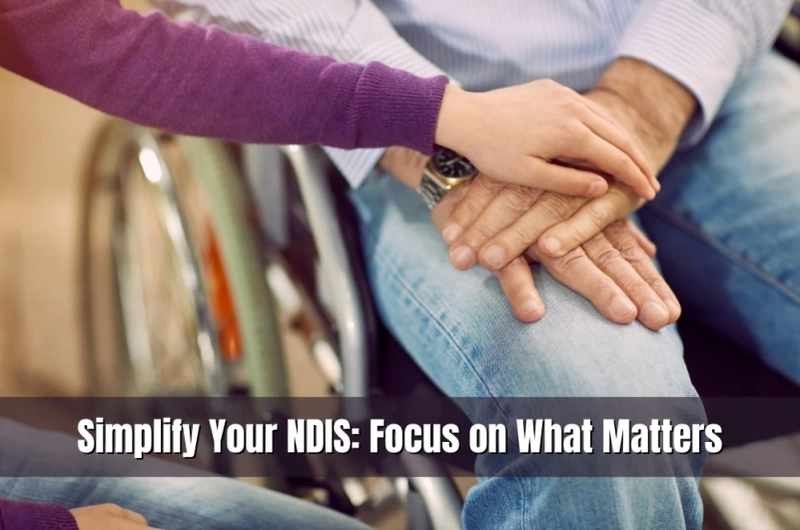Ever feel like the NDIS is more of a maze than a support system? Many Australians with disabilities and their families find navigating the National Disability Insurance Scheme (NDIS) incredibly complex, often getting lost in a sea of paperwork and confusing processes. This complexity can overshadow the very purpose of the NDIS: helping people reach specific objectives and lead a healthy life.
Finding reliable disability support can be a crucial first step in navigating these complexities, but understanding the system itself is equally important. It is even more overwhelming to become a carer and manage this NDIS plan alongside the effort of searching for a suitable and qualified provider. It can be easy to become overwhelmed by administrative details and lose sight of what truly matters: control, self-fulfilment, and a better standard of living.
Understanding your NDIS plan
Your plan makes the core of your NDIS experience. It provides an overview of the amount of funding that has been provided, objectives that have been defined, and resources that will be employed in the pursuit of these objectives. Here are some of the most critical aspects of your NDIS plan:
- Funding: The money allocated to you to access the support and services you need.
- Goals: These are your goals, which may include more independence, new skills and better social interaction to avoid social isolation.
- Supports: The services and assistance that will help you achieve your goals.
Effective plan management
Managing your NDIS funds can be time-consuming and sometimes confusing. Effective plan management can significantly streamline this process. There are a few options available:
- Self-management: You take complete control of your funding, paying providers directly and keeping track of your budget. This offers maximum control but requires significant administrative effort.
- Plan management agency: A registered plan manager handles the financial administration for you, pays invoices, and provides regular statements. This can free up your time and reduce stress.
- NDIA management: The NDIA manages your funds directly, paying providers on your behalf. This offers the least control but requires minimal effort from you.
Your choice of plan management depends on your situation and preferences. If you detest paperwork and budgeting, hiring a plan manager is a good investment.
The role of support coordination
Australia has an overwhelming NDIS environment; thus, choosing the right NDIS provider is a very challenging job. The way to achieve this is through support coordination. A support coordinator works with you to explain your plan, outline your services, and guide you in setting everything up. They can assist with:
- Understanding your plan: Decode the jargon and explain what your funding can be used for, including the funding process for support coordination so that you can maximise the resources available to you.
- Connecting with providers: Finding suitable service providers who can meet your specific needs.
- Coordinating services: Working together to make sure your supports happen smoothly.
- Building your capacity: Enabling you to acquire the knowledge and confidence that will help you to self-manage in the future when you implement your NDIS plan.
Accessing essential supports and services
The NDIS support and services provided range from therapies and personal care to assistance in community participation and skill development. It is thus essential to choose the right providers. In choosing your services, consider:
- Experience and qualifications: This must be done while making sure that the provider is capable of offering what you need and want.
- Service agreements: Negotiate with your providers to define the scope, cost, and conditions of service delivery.
- Regular reviews: It is highly recommended that patients follow up with their providers at stated intervals to confirm the extent to which the services provided are helpful to them.
Accessing services closer to your home, such as in Sydney, NSW makes it easier to access support and build stronger community connections.
Examples of support services in action
Let’s look at some examples of how different types of support can make a real difference:
- Daily living support: Special help with grooming, feeding, dressing, and even bathing contributes significantly to one's overall well-being. This can be especially important for individuals who require ongoing support to manage daily routines.
- Therapeutic supports: Speech therapy, physical therapy, and occupational therapy have the potential to directly improve a person’s communication, mobility, and skills to care for themselves and other personal requirements. These therapies demonstrate the importance of rehabilitation as part of healthcare, enabling individuals to participate more actively in their own lives and enhancing their overall well-being.
- Community participation: Supporting a person's involvement in social activities like planting or going to community events would prevent social isolation and help enhance their well-being. It notably supports a feeling of belongingness and attachment.
Conclusion
The simplification of the NDIS journey is about getting back to what really matters: achieving personal goals and improving quality of life. It's about understanding your NDIS plan, finding effective plan management options, using support coordination, and accessing the right services to make it easier to navigate the system. Remember, support that aligns with personal aspirations is key to a successful NDIS experience.
The information provided here is just a starting point, and conducting more in-depth research into available resources can be very helpful. Contacting local support providers can also offer guidance tailored to your specific needs and help connect you with valuable community resources. What strategies have you found most helpful in making your NDIS experience easier? Let us know your thoughts and insights in the comments below to assist others on their journey.



